- Home
- Jeff Mariotte
The Burning Season Page 23
The Burning Season Read online
Page 23
They questioned her, but her answers were barely coherent. She claimed that the men were white, then black, then admitted she couldn’t remember. She said there were two, then four. Once she sobered up, she might be more helpful, but that was anybody’s guess.
Back in the car after they gave up on Candy, Vega said, “I think we have a pretty good idea who to look at, even without her.”
“Carrizoza’s goons,” Ray said.
“Right.” Vega pulled away from the community center, heading down the street at ten miles above the speed limit and climbing. “Before I got the warrant, I did a quick records check for any other businesses he owned. I figured, you know, if he was snatching people up, cutting their hands off, a strip club might not be the best place for that. Lots of people around, and the music’s pretty loud, but someone might still hear screams or power tools from a back room.”
“Did you come up with anything?”
“A few places. He has a couple of restaurants, an apartment building. Real diversified businessman, right? But get this—one of his businesses is called Ozzie’s Auto Parts. New and used, mostly used.”
“Car parts?”
“Turns out the department’s auto theft task force has had their eye on the place for a while now. They think it’s a chop shop.”
Ray squirmed a little at the phrasing, though he did his best to hide it. The hard part about being a CSI was seeing close up the depths to which human beings could sink. As a doctor, he had seen plenty of injury and death, but the causes had always been a few steps removed, and thus more abstract. “An unfortunate nomenclature,” he said.
“If they do their chopping there, chances are that’s where they’ve got Ritz.”
“They didn’t kill him outright,” Ray said. “Which implies that he’s got something they want.”
“We think they know he was talking about Carrizoza to someone, and that’s what got him in trouble. Then we showed up at the club. Carrizoza might think Ritz was talking to you or me, but if he doesn’t know that for sure, he’ll want to find out.”
“They’re going to torture Ritz?”
“They might not need to. Most people, the threat of it is more than enough. Thing is, once he’s told them what they want to know, then he’s dead. We just have to hope Ritz knows that, and holds out as long as he can.”
Ritz had seemed plenty tough, during his brief meeting with Ray. But predicting how someone would stand up to torture, even something as brutally direct as having a hand cut off, was not an area of human psychology Ray considered himself proficient in.
Vega was right, though. Once Mickey Ritz talked, they’d have no reason to let him live. “Faster, Sam,” he said softly.
Vega floored it.
30
“DROP WHAT YOU’RE doing, Greg,” Catherine said.
Greg didn’t take her instructions literally. He was in the ballistics lab, test-firing an AK-47 confiscated at the Free Citizens compound to compare the rifling marks from their barrels with those on the rounds found at Alec Watson’s office. Those particular firearms had been in the lab before the cops were shot, so they weren’t suspect in that case. But so far, it was only a supposition that the same gun had been used on Watson and the cops, and no brass had been found at the police murder scene.
Instead of dropping the gun, he removed the magazine and put it down carefully on a workbench. “What’s up?” he asked, peeling off goggles and ear protectors.
“We’ve had units out looking at the likeliest properties taken over by Free Citizens, either as individuals or the organization,” she said.
“Right.” He already knew that. Catherine started walking, and he hurried to keep pace with her.
“A chopper did a flyover of a few bigger scores they’ve made—a ranch outside of town, some desert acreage—and when they passed over the Empire Resort and Casino—”
“Isn’t that the place that went under before it was finished?”
“The builders declared bankruptcy. They were probably glad to wash their hands of it when the Free Citizens placed a lien against it. So yes, it’s unfinished, and there’s every likelihood that it always will be. Anyway, the chopper pilot saw a recent model Mercedes SUV parked there, along with a couple of other vehicles.”
“The Kirklands?”
“That’s what we’re guessing. Brass and Lou are already on their way, but I want to be in on this arrest. If there’s evidence on those creeps, I want to get it before they’re booked and it’s compromised forever.”
“Works for me,” Greg said. “You want me to drive?”
“No. I’ll drive.” Catherine was silent for a moment, walking fast. “Never mind, you can drive.” She was distracted, Greg guessed. He would drive. It would be safer all the way around.
Catherine didn’t know why she had reacted that way to Greg’s suggestion that he could drive. She supposed it had to do with her unwillingness to let go, to simply let her team do their work without riding herd on them. Maybe it had to do with being the single mother of a teenage girl—a task requiring constant attention. Then again, it could have been a reaction to having to take over from Gil Grissom, who had often seemed almost preternaturally capable. She didn’t think she could ever follow in his footsteps; instead, she had to carve her own path. If that meant overcompensating sometimes, well, she would just have to overcompensate.
For the most part, she was comfortable with her leadership style. It was only at times like this, moments of real crisis, that she found herself second-guessing, wondering if she had made the right call. And sometimes that second-guessing came across wrong. She didn’t mind Greg’s driving, it had simply been one decision too many, when she had more important things on her mind.
Nick had reported in, letting her know that an arrest had been made in the forest fire. The suspect was a seventeen-year-old kid who claimed to have started it out of boredom, just for something to do. Nick and Sara were on their way down the hill, and the kid was in the custody of state police, with Juan Castillo overseeing his booking.
That was one thing off her plate. But that still left the attacks on Daniels, the shooting of two cops, the murder of Alec Watson, and the invasion of her own personal life.
Who’s going to drive?
The last thing she wanted to think about.
Las Vegas already had one casino with an ancient Roman theme, which Catherine thought sufficient for any given city. More than sufficient, for that matter. But the Empire Resort and Casino had promised to far outdo the existing outfit in tastelessness, and from what she had seen, it was well on its way to succeeding in that goal. The main building was to be an oversized replica of Rome’s famous Colosseum—never mind that until it had become famous simply for its architectural splendor, and for the fact that it had survived the centuries while Rome evolved around it, its main claim to fame had been the sheer amount of blood spilled within its curved walls. The promoters had implied that with its private areas, its members-only dining room and bars and pool, it would be the closest thing possible to storied Roman orgies. High rollers would, of course, have access to those areas; the general public would have to pay richly to join the private club. Many would no doubt be denied membership even if they raised the price, since the point of a private club was its exclusivity—not who could belong, but who could be kept out.
And yet, despite these appeals to the worst in humanity, the builders had gone belly-up before they got the doors open. Construction costs had skyrocketed, then credit became tight, land values plummeted. The economy of Las Vegas had suffered, and though it had hit the working poor and middle classes hardest, even people like those behind the Empire—entrepreneurs hoping to get rich on borrowed money—had been impacted. The last Catherine had heard of the Empire’s main “visionary,” he had moved back to Pittsburgh, where he’d come from originally, to run a branch of his family’s regional chain of hardware stores.
The empty, half-finished structure sat on the desert at the ed
ge of town, like an open sore on someone’s jawline. Once there had been billboards and banners promoting the project, but those had mostly been taken down or painted over. A few banners still fluttered in the night breeze, as forlorn as orphans or abandoned pets. So die the dreams of the boosters and boom-followers, Catherine found herself thinking. The history of the West followed the same pattern, over and over—boosters moving into a place, promising to make the desert bloom, swearing that the land would provide the kind of greenery that could be put in a bank. Whether it was crops or cattle, oil or uranium—or casinos—the boosters made promises that could be kept only in the short term, if at all. The gaming industry had proven more resistant than most, but over the decades of Las Vegas’s existence, casinos had gone under with distressing regularity. New ones were built in the ashes of the old. The fact that those ashes existed should have been a warning to the promoters.
Police vehicles were parked in no particular formation in the parking lot, along with a SWAT bus. Two helicopters chattered overhead. If anyone was hiding inside, they knew they weren’t alone. Greg and Catherine showed their badges to a cop at the top of the paved driveway and were waved inside. They found Brass and Vartann standing with a clutch of other cops and a SWAT commander, in the parking lot. The Mercedes SUV from the Orpheus parking garage was there, along with a pickup truck, an old Chevy Nova, and a recent model Ford Mustang.
A disturbingly authentic Colosseum loomed over it all, moonlight shining through its unfinished walls.
“Any sign of them?” Catherine asked, approaching the gathered men.
“Not yet,” Vartann replied. “Unless they’ve gone for a nighttime hike in the desert, they’re somewhere inside. We’re trying to get the blueprints brought up here so we can get a sense of the layout before we go in.”
“I guess the element of surprise isn’t really an issue.”
“Not at this point,” Brass said. “If I were them, I’d surrender. But I guess rationality isn’t highly valued in their circles.”
“Apparently not,” Catherine agreed.
A squad car rolled down the gentle slope of the driveway and came to a stop nearby. The uni who got out of the front passenger seat carried a long cardboard tube. “Here they are,” the SWAT commander said, putting his hand out for the tube. Catherine had met him a couple of times before. His name, Saenz, was lettered on the chest of his Kevlar vest. He was one of those men who had probably played football in school and looked like he still could—thick-necked, with a strong, assertive jaw, a mouth that looked somehow too small, and a nose that some previous confrontation had left skewed slightly to the left. His eyes were the only thing out of character; they were large and liquid, soulful eyes, she would have said, not the calculating ones she would have expected on someone in his position. When he was on the scene, it was an indication that violence was imminent. “Let’s have a quick look and put together an entry plan.”
The SWAT commander unrolled the blueprints on the hood of the car as other cops illuminated them with flashlights. He was pointing out the various entrances when the unmistakable crack of a rifle sounded in the distance. Almost simultaneously, the cruiser’s windshield shattered.
“Down!” Brass shouted. “Looks like they’ve moved up the timeline on our assault!”
Another shot rang out, echoing in the still night. This one found a human target, and a cop went down, blood spurting from his leg.
Catherine hunkered behind the cruiser with Greg, Lou, Brass, and Saenz. “They’ve hit one of our boys,” the SWAT officer said. “We’re going in, Jim. We’re hitting them hard and fast.”
“I’m right there with you,” Brass said. “Let’s wrap this up before they kill any more cops.”
31
RAY AND VEGA were the first ones at Ozzie’s Auto Parts, but shortly after they stopped in front of the main building, two squad cars pulled up and four uniformed cops piled out. The five men and one woman fanned out around the front, Ray and Vega heading for the front door, Ray with his field kit in the hand that didn’t hold a cane.
The place didn’t exactly inspire confidence. A sign announcing the business name hung above a sagging overhang that shielded the doorway from Las Vegas’s occasional rains. The walls were streaked and stained, as if the rust that attacked the steel of the parts they replaced had migrated onto the adobe. Two garage bays were closed off by huge steel doors, painted white many years earlier, and since then coated with soot and exhaust and graffiti until they were multicolored blurs, almost black above the reach of taggers.
The door was steel and glass, much of it covered by decals from auto part suppliers, signs announcing special offers, and the business hours. Although the place was open, according to the sign, the door was locked.
Sam Vega pounded on the glass. “LVPD!” he called. “Open up!”
When nobody responded after a minute, Vega turned toward one of the uniformed officers. “Open it, Mitch,” he said.
“Yes, sir,” the cop replied. He returned to his car and got a small handheld battering ram from the trunk. Vega and Ray stepped back from the doorway, and Mitch drove the ram into the steel frame of the door, just above the lock. With the fourth strike, the jamb cracked and the door swung open, its glass shattered.
The cop moved out of the way and Vega pushed through the broken doorway. He announced himself again, and went inside. The female cop followed him in, service weapon in her hand, and Ray went after her. The other three remained outside, on the watch for anyone trying to leave the premises.
They entered a sales area, with parts arranged neatly on display fixtures, a high retail counter, and behind that, tall shelves packed with cardboard cartons. The lights were on but nobody was in sight. Vega flipped up a hinged section of the counter and went behind it. A doorway at the back of the shelving area led to a lighted hallway, beyond which frantic activity could be heard.
“The place is surrounded!” Vega announced. “We have a warrant to search these premises.”
Still, no one responded or interacted with them. Vega and the uniformed officer, with Ray still close behind, hurried down the hall and into a garage bay. There was a BMW up on an elevated rack, half a dozen workmen in grease-stained jumpsuits around it. They had stopped work and stood in poses of tense anticipation, watching the newcomers.
Auto parts were stacked against a wall—bumpers, fenders, wheels, axles, hoods and more. Hanging fluorescent fixtures lit the room. The place had the air of a medieval torture chamber, with heavy chains and sharp-edged tools everywhere, the smell of burnt steel hanging in the air.
A man in a stained blue work shirt stared at the cops. He held a clipboard and wore a perplexed expression. His dark hair was thinning, showing patches of pale pink scalp underneath. “You shouldn’t be in here.”
“You didn’t exactly answer when we knocked.” Vega said.
“We’re closed.”
“Closed doesn’t apply to us.”
“There’s nothing I can do for you. The owner—”
“We know who the owner is,” Vega told him. “We’ll be dealing with him separately.”
“What do you want?”
Vega slapped the warrant onto the man’s clipboard. “We’re looking around,” he said. “And nobody’s going to get in our way.”
Ray drifted over to a workbench. He was used to mechanics who knew the value of their tools, who cared for them like they were their own children. But many of these tools were coated with rust and metal filings, blades chipped, drill bits worn and dull, only a few were clean and bright and cared for.
At a glance, he would not have guessed these were people who relied on their tools for their living.
One of the tools that was in reasonably good repair was a handheld circular saw, lying on its side with its blade up. The blade looked sharp and clean. But the casing didn’t, it was caked and flecked with brown. Like rust, except that rust had not settled on the saw itself.
Ray set his case on the floor
and opened it. A little luminol spray could quickly confirm his suspicion, but there was no way he would be allowed—or willing—to turn the lights off, to see if it would fluoresce. Instead, he took out a bottle of Hemastix and a small container of distilled water.
“What’s he doing?” the man with the clipboard demanded.
“Never mind him,” Vega said. “Everybody just stand where you are and we’ll be done here as fast as we can.”
With his usual care and precision, Ray took a three-inch plastic strip from the first bottle and dampened the little yellow pad at its end with some of the distilled water. He went back into the field kit for a control sample of known blood on cotton gauze, and he rubbed that against the moist pad. Almost immediately, the pad turned dark green. Although he knew what that meant, it only took an extra second to hold it up to the color chart printed on the side of the Hemastix bottle. The green color was a confirmation of the presence of blood. The Hemastix solution was still good. He put the used stick and the bloody gauze into separate envelopes and tucked them into the kit. Then he moistened another stick, and swabbed at the brown flakes on the saw casing.
Again, the yellow turned dark green.
The solution didn’t identify the source of the blood. It could have come from a butchered cow, or from a worker who had failed to exercise care when using the saw.
But it could also have come from using it to sever someone’s hand. Comparing its tooth pattern to the toolmarks found on the wrists would be the only way to confirm that. It was, he thought, enough to take some people in, and maybe under questioning one of them would crack.

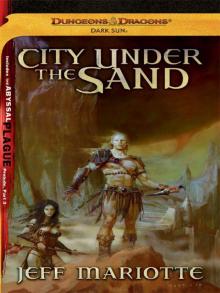 City Under the Sand
City Under the Sand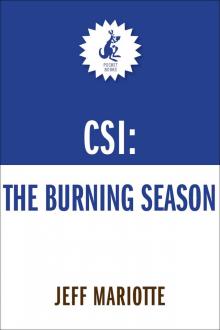 The Burning Season
The Burning Season Sanctuary
Sanctuary Winds of the Wild Sea
Winds of the Wild Sea Serpents in the Garden
Serpents in the Garden Close to the Ground
Close to the Ground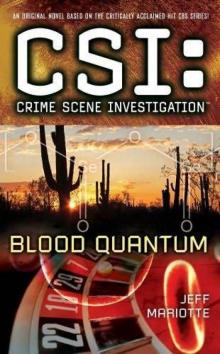 Blood Quantum
Blood Quantum Brass in Pocket
Brass in Pocket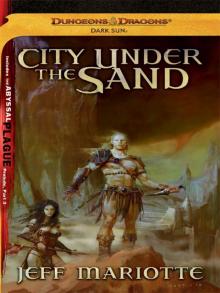 City Under the Sand: A Dark Sun Novel (Dungeons & Dragons: Dark Sun)
City Under the Sand: A Dark Sun Novel (Dungeons & Dragons: Dark Sun)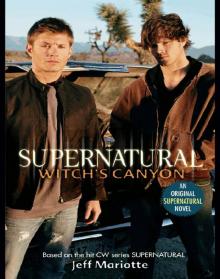 Witch's Canyon
Witch's Canyon STAR TREK: The Lost Era - 2355-2357 - Deny Thy Father
STAR TREK: The Lost Era - 2355-2357 - Deny Thy Father Dawn of the Ice Bear
Dawn of the Ice Bear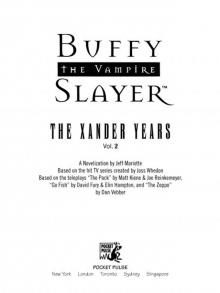 The Xander Years, Vol.2
The Xander Years, Vol.2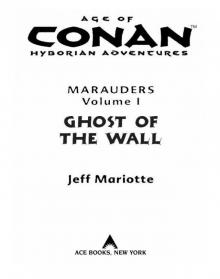 Ghost of the Wall
Ghost of the Wall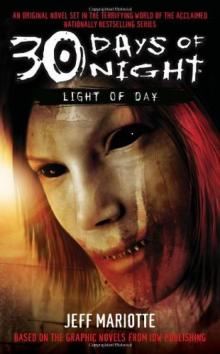 30 Days of Night: Light of Day
30 Days of Night: Light of Day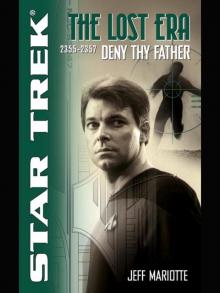 Deny Thy Father
Deny Thy Father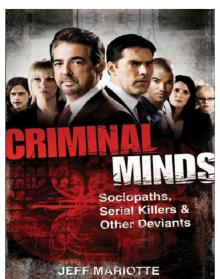 Criminal Minds
Criminal Minds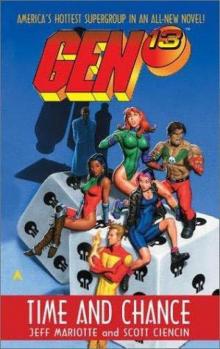 Time and Chance
Time and Chance The Folded World
The Folded World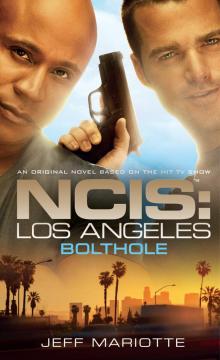 Bolthole
Bolthole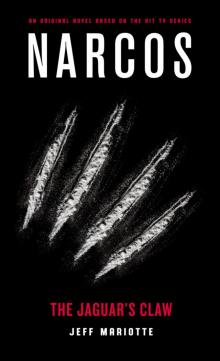 Narcos
Narcos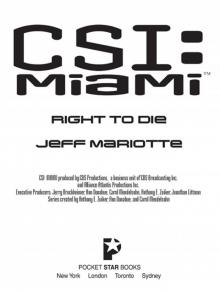 Right to Die
Right to Die